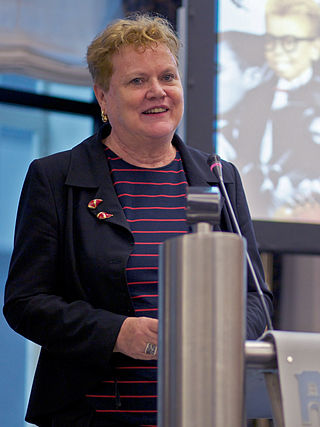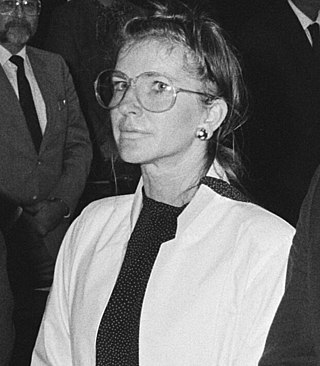The Labour Party is a social-democratic political party in the Netherlands.
The Christian Union is a Christian-democratic political party in the Netherlands. The CU is a centrist party, maintaining more progressive stances on economic, immigration and environmental issues while holding more socially conservative positions on issues such as abortion and euthanasia. The party describes itself as "social Christian".

The Christian Democratic Appeal is a Christian-democratic political party in the Netherlands. It was originally formed in 1977 from a confederation of the Catholic People's Party, the Anti-Revolutionary Party and the Christian Historical Union; it has participated in all but three cabinets since it became a unitary party.

The Anti-Revolutionary Party was a Protestant conservative and Christian democratic political party in the Netherlands. The party was founded in 1879 by Abraham Kuyper, a neo-Calvinist theologian and minister. In 1980 the party merged with the Catholic People's Party (KVP) and the Christian Historical Union (CHU) to form the Christian Democratic Appeal (CDA).
The Catholic People's Party was a Catholic Christian democratic political party in the Netherlands. The party was founded in 1945 as a continuation of the Roman Catholic State Party, which was a continuation of the General League of Roman Catholic Caucuses. During its entire existence, the party was in government. In 1977, a federation of parties including the Catholic People's Party, the Anti-Revolutionary Party (ARP) and the Christian Historical Union (CHU) ran together under the Christian Democratic Appeal (CDA) banner. The three participating parties formally dissolved to form the CDA in 1980.

The Pacifist Socialist Party was a democratic socialist Dutch political party. The PSP played a small role in Dutch politics. It is one of the predecessors of GroenLinks.

The Christian Historical Union was a Protestant Christian democratic political party in the Netherlands. The CHU is one of the predecessors of the Christian Democratic Appeal (CDA), into which it merged in September 1980.

The Communist Party of the Netherlands was a Dutch communist party. The party was founded in 1909 as the Social-Democratic Party (SDP) and merged with the Pacifist Socialist Party, the Political Party of Radicals and the Evangelical People's Party in 1991, forming the centre-left GreenLeft. Members opposed to the merger founded the New Communist Party of the Netherlands.

The Party for the Animals is a political party in the Netherlands. Among its main goals are animal rights and animal welfare.

The Socialist Alternative Politics is a Trotskyist political group in the Netherlands without parliamentary representation.

Johan Georg "Jan" Nagel is a Dutch politician who was a member of the Labour Party, and later formed his own parties. He is currently in the Pensioners' Party 50PLUS.

Jeltje van Nieuwenhoven is a retired Dutch politician of the Labour Party (PvdA) and librarian.

This article gives an overview of Christian democracy in the Netherlands, which is also called confessionalism, including political Catholicism and Protestantism. It is limited to Christian democratic parties with substantial support, mainly proved by having had a representation in parliament. The sign ⇒ means a reference to another party in that scheme.
Philippine Johanna "Phili" Viehoff born Maag-van Os van den Abeele was a Dutch politician of the Labour Party. Between 1974 and 1977 she served on the municipal council of Hoevelaken and in the States of Gelderland. Between November 1979 and July 1989 she was a Member of the European Parliament (MEP).

Wil Velders-Vlasblom was a Dutch politician and woman's rights activist. She was the first woman alderman in Utrecht, and later served as mayor of Beverwijk. During the 1970s and a portion of the 1980s, Velders-Vlasblom was the face of the PvdA party in Utrecht.

Elisabeth Jacoba den Uyl-van Vessem was a Dutch activist, politician, and writer, involved with the PvdA, the Dutch social-democratic party. She was the wife of politician Joop den Uyl, and was socially and politically active. She wrote for magazines including Opzij, Vrij Nederland, Margriet, and for Het Parool.
Early general elections are scheduled to be held in the Netherlands on 22 November 2023 to elect the members of the House of Representatives. The election had been expected to be held in 2025, but a snap election was called after the fourth Rutte cabinet collapsed on 7 July 2023 due to disagreements on immigration policy. Incumbent Prime Minister Mark Rutte has announced that he will not lead his party into the election and that he will be retiring from politics.
Anarchism in the Netherlands originated in the second half of the 19th century. Its roots lay in the radical and revolutionary ideologies of the labor movement, in anti-authoritarian socialism, the free thinkers and in numerous associations and organizations striving for a libertarian form of society. During the First World War, individuals and groups of syndicalists and anarchists of various currents worked together for conscientious objection and against government policies. The common resistance was directed against imperialism and militarism.

Nancy Sophie Cornélie "Corry" Tendeloo was a Dutch lawyer, feminist, and politician who served in the House of Representatives for the Free-thinking Democratic League (VDB) from 1945 until 1946 and then for the newly-formed Labour Party (PvdA) until her death in 1956. Born in the Dutch East Indies, Tendeloo studied law at Utrecht University, during which time she made contact with people within the women's rights movement. She became politically active in the 1930's and was elected to the Amsterdam City Council for the VDB in 1938. After World War II, Tendeloo was appointed a member of the House of Representatives for the VDB in the national emergency parliament, formed to rebuild the country and organise elections. In 1946, the VDB merged with other parties into the PvdA, which Tendeloo represented in parliament. She sat on two select committees and spoke in favour of women's rights issues.

Elisabeth Maria Petronella Baarveld-Schlaman was a Dutch politician. She was a member of the Senate of the Netherlands from 1981 to 1995, a member of the Parliamentary Assembly of the Council of Europe and vice-chairperson of the Defense Committee of the Western European Union. She was a member of the Democrats 66 and the Labour Party.













